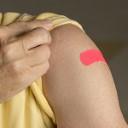-
Cancer Patients Should Receive Flu Shots
People with cancer are at increased risk of serious complications if they get the flu. Flu shots are safe for this group, and a recent study bolsters evidence of their effectiveness.
by Carly Weeks
-
First Ladies of Africa Issue Call to Address Cancer Crisis
A coalition of wives of African leaders, originally dedicated to addressing HIV/AIDS, is now also taking on the growing problem of cancer.
by Bradley D. Miller, PhD
-
Patients and Caregivers Raise Their Voices
The fall 2019 Cancer Today tells the stories of advocates who are using the internet to amplify their voices, patients who are navigating the world of complementary medicine and researchers who are devising new immunotherapies.
by Kevin McLaughlin
-
What to Do About Lymphedema?
In a randomized study, weight loss and home-based exercise did not improve lymphedema symptoms in breast cancer survivors.
by Anna Azvolinsky
-
HIV Can Worsen Cancer Treatment Outcomes
People with HIV who develop certain cancers are more likely to die from them than patients without HIV—even if they receive similar treatment.
by Jon Kelvey
-
Finding Support in Unlikely Places
After her diagnosis with ovarian cancer, Patricia Anne Ward noticed that some friends and family pulled away. She found connection outside her usual circles.
by Patricia Anne Ward
-
A Researcher Attends a Conference, This Time as a Patient Advocate
My most meaningful moments at my first cancer research conference came from embracing my experience as a patient—not as a researcher.
by Jamie Aten
-
Advocacy Spotlight: A Mission to Bring Awareness
Minister and thyroid cancer survivor Thurselle C. Williams speaks at conferences and events about cancer awareness and, ultimately, healing following her 2016 diagnosis.
by Erin L. Boyle
-
Do Patients Want Online Access to Test Results?
A survey finds many patients prefer talking through imaging findings related to cancer with their physician rather than viewing reports online—but only if the wait for results is short.
by Cindy Kuzma
-
Immunotherapy in the Elderly
Immune checkpoint inhibitors can be effective treatments for elderly people with some types of advanced cancer, but more information is needed on their risks and benefits in this group.
by Emma Yasinski
Cancer Talk
Treating HER2-ultralow Breast Cancer
FDA approval expands treatment options for people with metastatic breast cancer that expresses minimal levels of HER2.
by Sandra Gordon
Lessons Learned as a Caregiver and PatientAfter caring for her husband during his cancer treatment, Miriam Díaz-Gilbert was prepared to face her DCIS diagnosis.
by Miriam Díaz-Gilbert
Screening Options for People With Dense BreastsReports on breast density inform women of their status but raise questions about what to do next.
by Robin Roenker
Injection Immunotherapies Get FDA ApprovalGiving immunotherapy drugs as injections, rather than intravenously, means patients can spend less time in the hospital or treatment center.
by Laura Gesualdi-Gilmore














